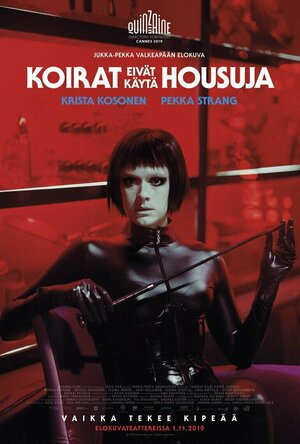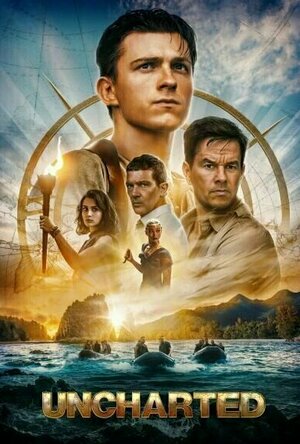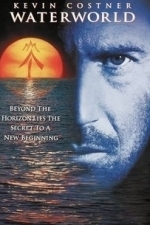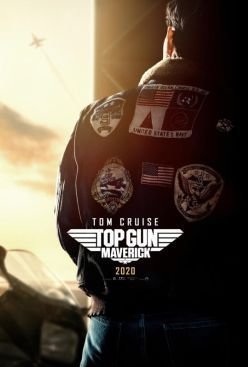Search
Search results
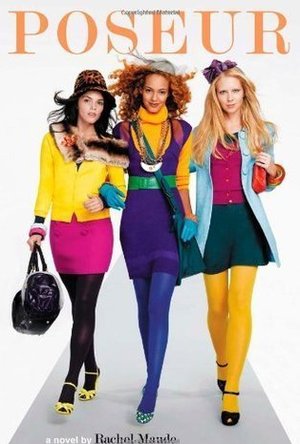
Poseur (Poseur #1)
Book
po·seur (noun): a person who pretends to be what he or she is not. Charlotte Beverwil, Janie...
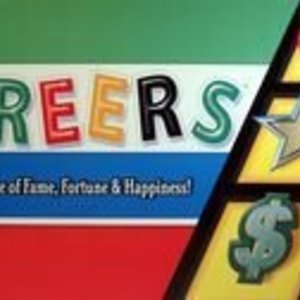
Careers
Tabletop Game
Careers is a game where the players set their own victory conditions. A player may choose to pursue...
BoardGames ClassicGames
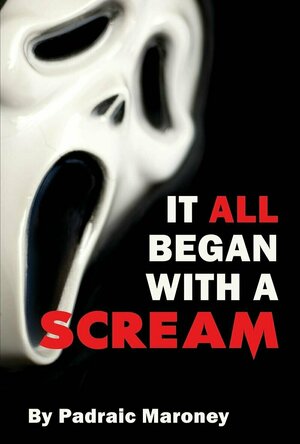
It All Began with a Scream
Book
In 1996, a movie came along that changed the face of horror films forever. Initial signs indicated...
GustavoCampello (6 KP) rated Dogs Don't Wear Pants (2019) in Movies
Feb 10, 2022
The film reminded me a lot of the Mexican Leap Year, despite being a more pop version, as its Latin counterpart is rawer, denser and sadder. It doesn't mean that this film doesn't have its moments of rawness, density and sadness, but it is aesthetically more beautiful, it has a certain American film standard. The scenes of Juha trying to hold on to his wife's memories are very sad. The actors make the movie work, the duo, as strange as it may seem, managed to forge a nice chemistry. There is a lot that was left open and that could be better worked on in countless points, Juha's relationship with her daughter is just one of them. The ending left me with mixed feelings, but I got into the mood. The film only gets lost when it tries to emulate some points of Hollywood cinema, otherwise it made a good film. Krista Kosonen steals the scenes in which she appears, an actress who deserves much more than being an extra in Blade Runner.
Lee KM Pallatina (951 KP) rated Uncharted (2022) in Movies
Aug 2, 2022
Uncharted, because no one knows where their going..
Uncharted is a live action take on the extremely popular video-game franchise of the same name.
Featuring a bunch of top Hollywood names both past and present, the first installment focuses on the fourth installment of the games and changes a lot of the original plot making for some very interesting possible sequels.
A lot of great action scenes and sequences and some light humour (although more humour was needed) and a straight forward plot made this a very enjoyable action adventure.
The duo of Mark whalberg as Victor sully and Tom Holland as Nathan drake is a very odd but fitting piece that seems to work naturally.
Did you know?
Mark whalberg was originally set to play Nathan drake before being bumped to play Victor sully so Tom Holland could play Nathan drake.
Nathan fillion was also poised to play Nathan drake as fans wanted it, although it didn't happen, fillion did make a short film where he played uncharted's protagonist.
(it's on YouTube).
-maybe we'll see MW play Nathan drake one day.
Featuring a bunch of top Hollywood names both past and present, the first installment focuses on the fourth installment of the games and changes a lot of the original plot making for some very interesting possible sequels.
A lot of great action scenes and sequences and some light humour (although more humour was needed) and a straight forward plot made this a very enjoyable action adventure.
The duo of Mark whalberg as Victor sully and Tom Holland as Nathan drake is a very odd but fitting piece that seems to work naturally.
Did you know?
Mark whalberg was originally set to play Nathan drake before being bumped to play Victor sully so Tom Holland could play Nathan drake.
Nathan fillion was also poised to play Nathan drake as fans wanted it, although it didn't happen, fillion did make a short film where he played uncharted's protagonist.
(it's on YouTube).
-maybe we'll see MW play Nathan drake one day.
Karla Dee (6 KP) rated Bad City: Peril and Power in the City of Angels in Books
Aug 26, 2022
My prima just moved back to the midwest after being in hollywood and wow did I hear some stories about dark hollwood, woah! I can't share that business but I can share what I read in this book about a Doctor who uses his power and money to control heroine and meth addicts in Cali. I love how the author pursues this story even though the whole city and all the magazine editors are in the Doctors pocket. Honestly the city of Pasadena seemed very nice and bougie before Paul Pringle exposed the city hall and the police department in having covered up an overdose where a girl could have died. A good Samaritan working at the hotel tipped off authorities which led to Pringle finding about the case and believing that there is a cover up. Pringle's persistence in getting a well to do university to talk and the police department to write up a report they had ignored at first just shows a little of his badass detective work. Def recommend reading the whole report aka book <3
David McK (3676 KP) rated Waterworld (1995) in Movies
Jun 21, 2022
The movie that all-but-sank Kevin Costner's career
In the early to mid 90s, Kevin Costner was riding high in Hollywood.
Then he had the one-two misfore of this (at one point, the most expensive flop ever made, I believe) and 'The Postman'.
Both are set in a post-apocalyptic future: here, one where the world has flooded 'due to the melting of the ice shelves' (don't even), with 'dry land' now virtually a myth and where gangs of bikers roam the outlands on custom-built vehicles in search of fuel ...
Sorry, sorry, that's Mad Max.
But you can definitely see the similarities: swap the bikers for jet ski's, replace the loner character played by Mel Gibson for one played by with Kevin Costner and you're virtually there!
Add a bit of Dennis Hopper to completely ham it up, a soupcon of mystery around The Mariner and his mutation, and a search for the mysterious Dryland and there you have it ...
Not as bad as it's made out to be, but nor is it brilliant by any stretch of the imagination
Then he had the one-two misfore of this (at one point, the most expensive flop ever made, I believe) and 'The Postman'.
Both are set in a post-apocalyptic future: here, one where the world has flooded 'due to the melting of the ice shelves' (don't even), with 'dry land' now virtually a myth and where gangs of bikers roam the outlands on custom-built vehicles in search of fuel ...
Sorry, sorry, that's Mad Max.
But you can definitely see the similarities: swap the bikers for jet ski's, replace the loner character played by Mel Gibson for one played by with Kevin Costner and you're virtually there!
Add a bit of Dennis Hopper to completely ham it up, a soupcon of mystery around The Mariner and his mutation, and a search for the mysterious Dryland and there you have it ...
Not as bad as it's made out to be, but nor is it brilliant by any stretch of the imagination
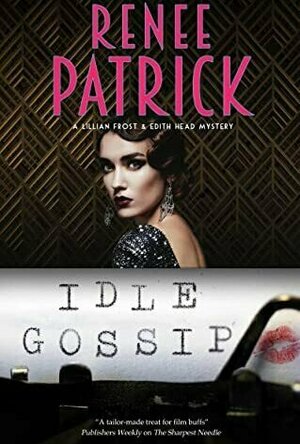
Idle Gossip
Book
Gossip columnist Lorna Whitcomb knows every dirty secret in Hollywood . . . except who killed her...
David McK (3676 KP) rated Top Gun: Maverick (2022) in Movies
Jun 5, 2022 (Updated Jun 17, 2023)
Legacy Sequel entry number ...?
Legacy Sequels.
That's a term for what seems to be becoming more and more the norm in Hollywood of late: sequels of films made decades ago, that don't necessarily *need* said sequel. Some examples:
Star Wars: The Force Awakens
Jurassic World
Mary Poppins Returns
Ghostbusters: Afterlife
and now 'Top Gun: Maverick', with Tom Cruise returning to one of his signature roles from the mid-80s, as Captain Pete 'Maverick' Mitchell.
No Kelly McGillis this time around, with her spot (and role in the proceedings) instead being taken by Jennifer Connolly's admirals daughter Penny (name dropped, but never shown in the original).
Yes, there's a definite argument to be made that, shall we call it, 'the mission' here has been done before (try watching the original Star Wars, retroactively titled 'A New Hope' and play spot the similarities), and yes, the plot may be predictable, but when it's all this much fun ...
(and no, you don't need to have seen the original, although that may help)
That's a term for what seems to be becoming more and more the norm in Hollywood of late: sequels of films made decades ago, that don't necessarily *need* said sequel. Some examples:
Star Wars: The Force Awakens
Jurassic World
Mary Poppins Returns
Ghostbusters: Afterlife
and now 'Top Gun: Maverick', with Tom Cruise returning to one of his signature roles from the mid-80s, as Captain Pete 'Maverick' Mitchell.
No Kelly McGillis this time around, with her spot (and role in the proceedings) instead being taken by Jennifer Connolly's admirals daughter Penny (name dropped, but never shown in the original).
Yes, there's a definite argument to be made that, shall we call it, 'the mission' here has been done before (try watching the original Star Wars, retroactively titled 'A New Hope' and play spot the similarities), and yes, the plot may be predictable, but when it's all this much fun ...
(and no, you don't need to have seen the original, although that may help)
Mark @ Carstairs Considers (2466 KP) rated Hidden in Smoke in Books
May 1, 2025 (Updated May 1, 2025)
Searching the Smoke for the Truth
West Hollywood has been rocked by a series of arsons in one night. The arsonist hit multiple apartment buildings by setting fire to a car in a car port. Just as Sharpe and Waler are beginning to piece some key clues together, a major fire impacts the city. Will this new fire distract them? Or will they be able to solve it as well?
There is a strong secondary plot as well that includes some major spoilers for the first book in the series. I didn’t like that storyline because it slowed things down with flashbacks and introduced some politics that hit wrong, especially after events in the last couple of months. On the other hand, I enjoyed the main storyline and all the great twists along the way. The characters are good but flat, and the male teenage humor doesn’t help them. There are some other laughs and great banter. I also enjoyed some scenes that were set close to me. Fans will enjoy this book, but I do wish it were stronger.
There is a strong secondary plot as well that includes some major spoilers for the first book in the series. I didn’t like that storyline because it slowed things down with flashbacks and introduced some politics that hit wrong, especially after events in the last couple of months. On the other hand, I enjoyed the main storyline and all the great twists along the way. The characters are good but flat, and the male teenage humor doesn’t help them. There are some other laughs and great banter. I also enjoyed some scenes that were set close to me. Fans will enjoy this book, but I do wish it were stronger.
